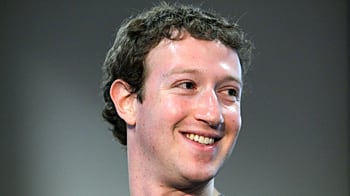Regardless of whether you think The Social Network is a fair portrayal of the early days of Facebook ( I don't), the new movie offers a useful window into why Facebook triumphed to become perhaps the fastest-growing company in history.
The film tells the tale of a 19-year-old Mark Zuckerberg inventing his new social network Thefacebook at Harvard, surrounded by other students who felt he stole their ideas or disregarded their contributions. But it's worth looking at the nature of the conflicts he had both with the Winklevoss twins and Divya Narendra—the team that wanted to build the service called Harvard Connection and hired Mark Zuckerberg to help them—and with Eduardo Saverin, Zuckerberg's onetime friend who he later ejected from his company. These two conflicts form the dramatic heart of the movie.
Zuckerberg wanted to create a service that was functional and useful to the students of Harvard, and later students at other schools. Though the movie obscures these ideas, in reality he was driven by his vision of a changing world in which the Internet made it dramatically easier to share information between people. His new service offered no content of its own, and made no judgments about how users would employ it. Thefacebook was nothing but a platform—a receptacle for the contributions of its users. Zuckerberg's passion and commitment was devoted to fulfilling the potential he saw in this new kind of platform for sharing.
Harvard Connection, on the other hand, was an idea driven by a far lower set of motivations—a greedy cynicism and desire merely to exploit commercial opportunity. It was a service aiming from the start to capitalize on students' desire for status. In the movie, the Winklevosses and Narendra celebrate the exclusivity the Harvard name would connote, because it represented the top of the social heap which everyone, in their view, wants to aspire to (and which, not coincidentally, they had already attained). In the words of the Tyler Winklevoss character, "This site would be based on the idea that girls want to meet guys who go to Harvard."
The Winklevosses and Narendra were also cynical in other ways about their planned enterprise. They were apparently comfortable misleading prospective users about how it worked. Emails exchanged between them and Zuckerberg were used in the movie—and in their real lawsuit against him—to bolster the case that Thefacebook's CEO wronged them. (He probably did, though by misleading them rather than by stealing their ideas.) But one email not used in the movie reveals something else—a disregard for truth. In a message I published in my book, The Facebook Effect: The Inside Story of the Company That Is Connecting the World, Cameron Winklevoss talks about the service he wanted Zuckerberg to build. He calls it a "dating site." It aimed, among other things, to pair people up by using software to calculate who belonged together. “Perhaps," wrote Winklevoss, "there could be some random element incorporated into it (obviously people viewing the site shouldn’t know this, for all they know it’s a thoughtfully calculated recommendation)” [sic].

This opportunistic way of thinking about users is very different from how Zuckerberg thought or thinks. Interestingly, it wasn't long after that email was sent, on December 6, 2003, that Zuckerberg apparently began disregarding messages from the Harvard Connection partners and instead began focusing his efforts on building Thefacebook. It's possible his distaste for the Winklevoss/Narendra mind-set led him to distance himself. As I explain in my book, Zuckerberg strongly believes that honest disclosure leads to better behavior. He is a fervent believer in transparency both for companies and for individuals.
Zuckerberg was also strongly against imposing many ads upon Thefacebook's users. A central element in the movie, more or less accurate, is that Saverin wanted to "monetize" Thefacebook quickly. He is shown constantly urging his partner to put more ads on the system. Zuckerberg, on the other hand, felt strongly that growing Thefacebook was more important than milking it for short-term profit.
Zuckerberg strongly believes that honest disclosure leads to better behavior. He is a fervent believer in transparency both for companies and for individuals.
Zuckerberg successfully resisted Saverin's pleas to turn Thefacebook into a highly commercialized ad platform, because he thought users would dislike it. Saverin's insistence the service should include more ads is accurately shown in the movie to be a key reason Zuckerberg forced him out. Meanwhile, Thefacebook, renamed Facebook, has grown into the world's most popular website, with a bare minimum of advertising. Zuckerberg has continued to place user growth, and user satisfaction as a means to achieve it, at the top of his priorities.
Cameron and Tyler Winklevoss, their partner Divya Narendra, and Eduardo Saverin had one thing in common—all their ideas were small. By contrast, while Zuckerberg does not repudiate profit, he felt both then and now that ultimately the most profit will come as the result of providing the greatest possible service to users.
Zuckerberg told me when I interviewed him for my book that he believes that today companies have no choice but to be "good." The reason, in part, is that the people who are your customers—in any business—are now vastly more empowered than ever before to speak their minds and take effective action. Companies that disregard this put themselves and their products in jeopardy. That empowerment in turn is bolstered by Facebook itself. (Just last week, a user revolt on Facebook over a new logo for The Gap put that company on the defensive.)
While many in Silicon Valley and technology applaud the single-mindedness shown by the on-screen Zuckerberg, others think the film oversimplifies what it takes to start a great company. Some technology critics see the movie as treating the invention of Facebook as something analogous to the successful invention of a new washing machine or flavor of cereal. In the New Republic, Internet legal scholar Lawrence Lessig writes: "In interviews given after making the film, [the movie's screenwriter Aaron] Sorkin boasts about his ignorance of the Internet. That ignorance shows." (Ironically, Sorkin has repeatedly spoken about his disdain for the "anonymity" of the Internet, apparently not realizing that Facebook, because it is based on real names and genuine identity, attempts more than any other major online service to undercut that anonymity.)
John Hagel, author of numerous books on the Internet and co-chairman of the Deloitte Center for Edge Innovation, goes further, in an essay on his website. He sees both the filmmakers and the numerous old-media critics who have rhapsodized ecstatically over the movie as motivated by a vengefulness toward new media. "We live in the midst of a social revolution" writes Hagel, "and this movie represents the effort of mass media to make sense of the changes going on around them." He quotes from the Rolling Stone review by Peter Travers, who wrote “The final image of solitary Mark at his computer has to resonate for a generation of users (the drug term seems apt) sitting in front of a glowing screen pretending not to be alone.” Hagel sees the film as an effort to portray the changes wrought by the Internet and Facebook as tragic. That, of course, is the opposite of the Silicon Valley view.
The Social Network pretends to explore the question of who deserves credit for the origins of Facebook. Numerous scenes show depositions in separate lawsuits by Winklevoss/Narendra and Saverin against Zuckerberg and Facebook, which were both ultimately settled with generous amounts of Facebook stock. The reality is that Facebook would never have taken over the world if it had been led by people with the attitudes of the Winklevosses, Narendra, or Saverin. Those guys should feel fortunate that Facebook—guided by principles far different and more modern than theirs—succeeded so massively. That is the only reason they could be so amply rewarded for so little effort.
David Kirkpatrick writes about technology for The Daily Beast. A former Fortune reporter, he is the author of The Facebook Effect: The Inside Story of the Company That Is Connecting the World.






